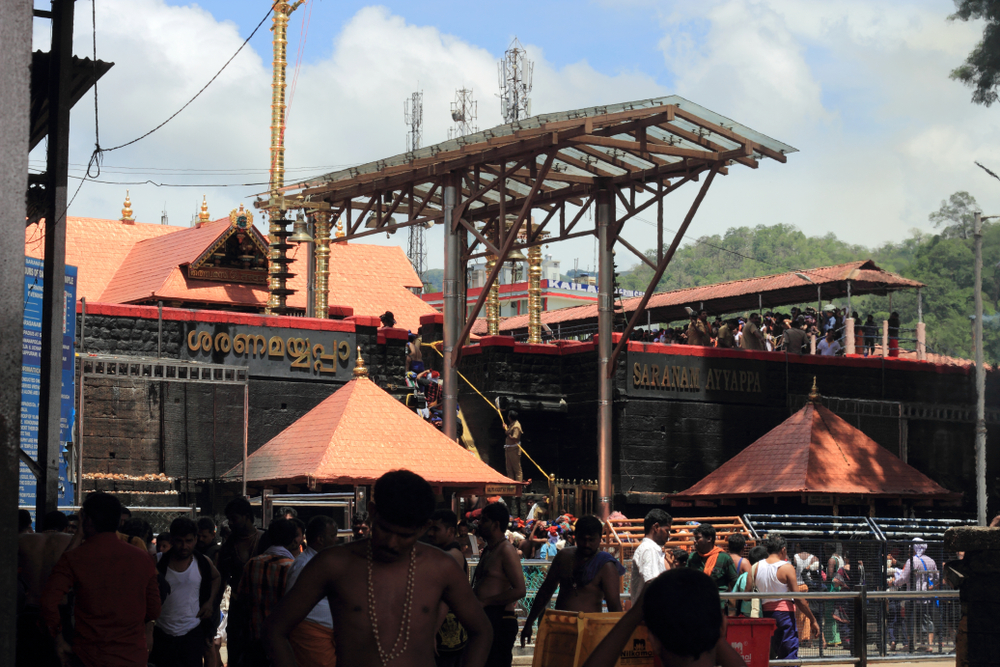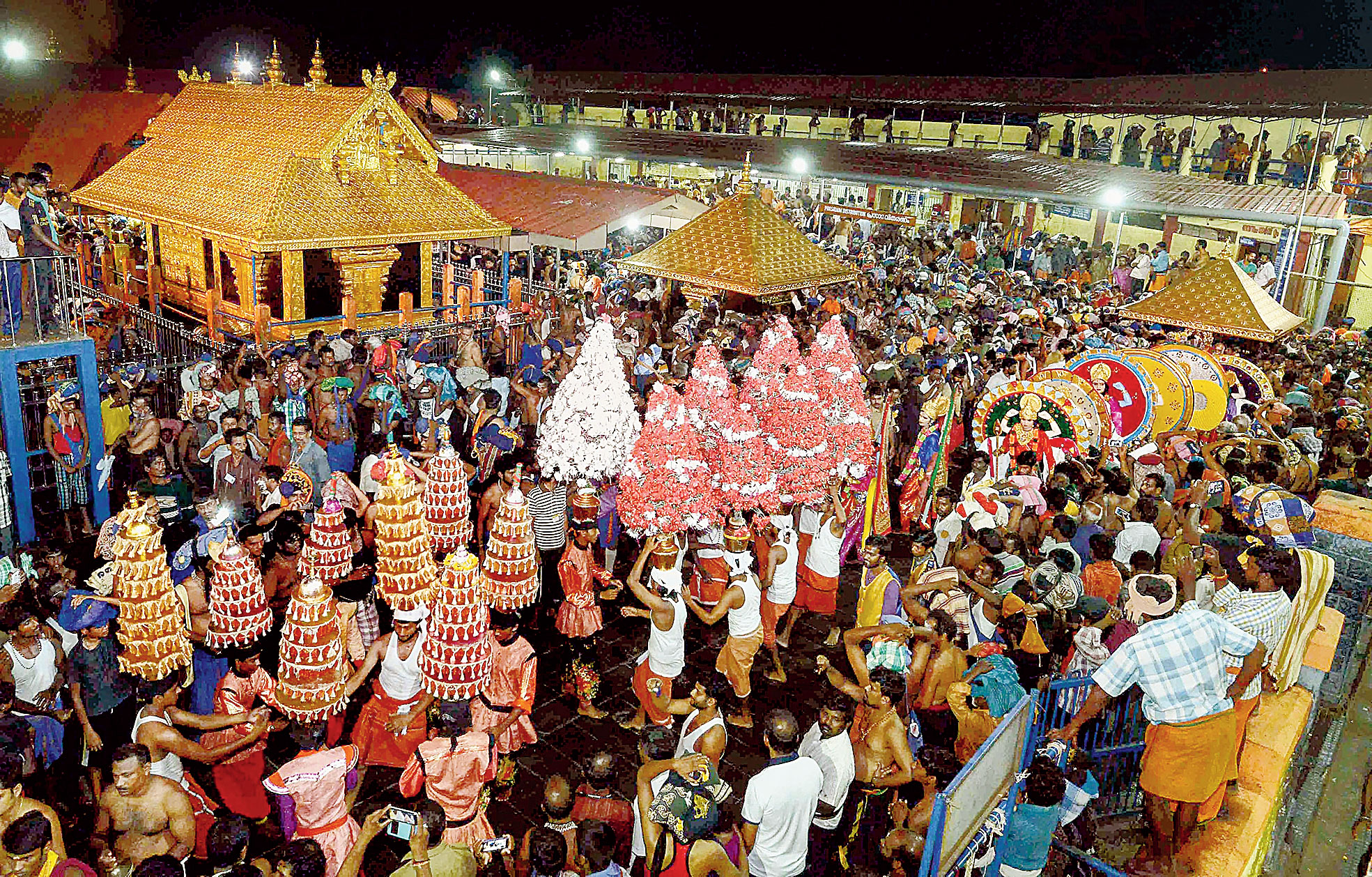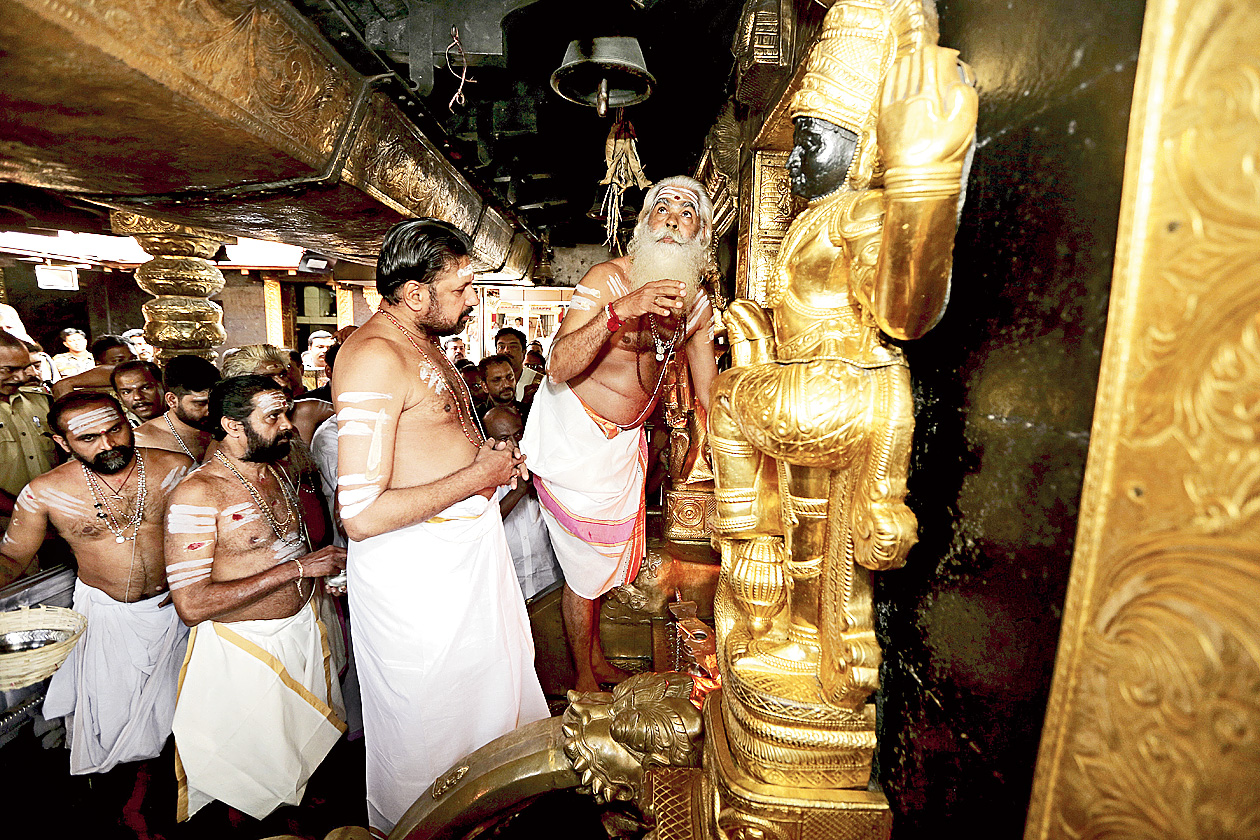The Kerala government on Wednesday defended in the Supreme Court the September 2018 verdict allowing women of all ages to visit the Sabarimala temple, saying arguments about “social peace being destroyed” cannot be a ground for recalling the judgment.
The state-appointed Travancore Devaswom Board, which manages the shrine, backed the Kerala government’s stand, shedding its earlier support for the centuries-old entry ban on women of childbearing age (construed to be 10 to 50 years).
A five-judge constitution bench was hearing a batch of 60 petitions, of which 55 sought a review of the September judgment on the ground that it violated the devotees’ fundamental religious rights. The rest defended the September verdict, with two of them seeking contempt proceedings against those resisting its implementation.
The bench of Chief Justice Ranjan Gogoi and Justices R.F. Nariman, A.M. Khanwilkar, D.Y. Chandrachud and Indu Malhotra reserved its verdict.
It was a surprise that none from the Centre’s panel of lawyers --- not even attorney-general K.K. Venugopal or solicitor-general Tushar Mehta --- participated in the daylong hearing of such a high-profile case.
Neither the NDA government nor the Congress has filed any intervention application despite the state Congress opposing the September verdict and the BJP having whipped up street frenzy against its enforcement.
Senior advocate Jaideep Gupta, appearing for the Kerala government, argued that those seeking the verdict’s recall had not offered any legal arguments but merely harped on “social peace being destroyed”, which should not bother the constitutional court.
He said the Sabarimala temple was not a denominational institution unlike the Rama Krishna Mission or Shirur Mutt, which enjoy certain protections under Articles 25 (freedom of religion) and 26 (management of religious affairs) of the Constitution.
Gupta also distinguished between “essential religious practices” --- which may enjoy a degree of constitutional protection --- and “essential practices of a temple”.
“If Your Lordships are required to go into the essential practices of temples one by one, there is sufficient uniqueness in each of them,” he said, citing the Jagannath, Kashi Vishwanath and Tirupati temples as examples.
“Excluding a person till the age of 50 is exclusion for a major portion of one’s lifetime”, which is unconstitutional, he said.
Senior advocate Rakesh Dwivedi, appearing for the Devaswom Board, said a ban that violated the constitutional rights of equality and non-discrimination could not be defended citing constitutional rights relating to religion.
“We cannot point out biological attributes to exclude women from any walk of life,” he said.
Justice Malhotra wondered why the board had changed its stand since the hearing of the main petition last year.
“We have taken a decision to respect the judgment of this court and not seek a review,” Dwivedi said without elaborating.
Media reports had said the board had received a tongue-lashing from chief minister Pinarayi Vijayan after initially declaring it would seek a review of the September verdict.
A host of senior advocates spoke for and against the September verdict. Indira Jaising, representing a group of women devotees, sought appropriate directions against those violating the court’s order.
P.V. Dinesh, whose clients have moved contempt petitions against the head priest for resisting the judgment’s implementation, argued that restricting the entry of even 10-year-old girls was a “derogatory practice” amounting to “portraying the girl child as a sexual object”.
V. Giri, appearing for the head priest, argued that the ban was not based on physiological attributes but was meant to “protect the basic character of the deity being a naisthika brahmachari (lifelong celibate)”.
He said the country had over a thousand Ayyappa temples but Sabarimala alone attributed such a trait to its presiding deity.
“Every devotee who goes to a temple doesn’t go there to question what is the essential practice of the temple; he goes there to offer worship to the deity,” Giri said.
He highlighted that no devotee had ever challenged the ban; it was an NGO that did.
Abhishek Singhvi, who appeared for former board chief P. Gopalakrishnan, too stressed the celibacy doctrine to argue the ban was “based on intelligible, not mindless, doctrine” and had “a nexus which is intrinsic to the character of the deity”.
He argued that the court had erroneously ruled that the ban amounted to “untouchability”, for it was not based on the caste or religion of those banned.
K. Parasaran, appearing for some devotees, argued that the principles of “constitutional morality” the apex court had invoked do not apply to religious beliefs long predating these principles.













